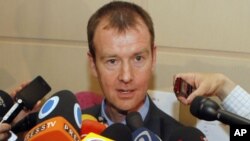Talks in Istanbul involving P5+1 countries and Iran over Tehran's controversial nuclear program have ended with a commitment to further talks that are scheduled to take place in Baghdad next month. Both sides described Saturday's Istanbul meeting as being held in a positive and constructive atmosphere.
After nearly 10 hours of talks in Istanbul between Iran and world powers, Catherine Ashton, the European Union foreign policy chief, described the discussions as a success.
"The discussions on the Iranian nuclear issue have been constructive and useful," she said.
Saturday's talks saw diplomats from the United States, Britain, China, France, Germany and Russia meeting with their Iranian counterparts. It was the first meeting since talks collapsed 15 months ago in Istanbul, amid mutual recriminations. Iran says its nuclear program is peaceful, but critics suspect it is being used to develop weapons.
Iran's chief negotiator, Saeed Jalili, said Saturday's talks saw important common ground being developed. "We have differences of opinion, but the points we agreed upon are important and significant. Various issues for cooperation and issues for talks were agreed upon for the next meeting," he said.
That next meeting is planned for Baghdad in May. Apart from both sides recognizing the importance of abiding by the Nuclear Non-Proliferation Treaty, and acknowledging Tehran's right to develop nuclear energy, there were no other specific details of what common ground was achieved. A series of meetings is planned ahead of the Baghdad talks.
Those meetings are expected to bring together diplomats and technical experts who will aim to lay the groundwork for concrete proposals to be discussed in Baghdad. The EU foreign policy chief says an important process has been started.
"We want now to move to a sustained process of serious dialogue where we can take urgent and practical steps to build confidence and lead on to compliance by Iran with all its international obligations. In our efforts to do so, we will be guided by the principle of the step-by-step approach and reciprocity," she said.
The current talks come as international pressure on Tehran continues to mount. New U.S. and EU economic sanctions against Iran are due to come into effect July 1, while Israel has warned it may take military action.
U.S. President Barack Obama has also warned the latest diplomatic efforts are the last chance for diplomacy to work. Observers say next month's meeting in Baghdad will be a key test of those efforts, when the talks are expected to start to focus on concrete measures to allay international concern over Iran's nuclear program.
| Join the conversation on our social journalism site - Middle East Voices. Follow our Middle East reports on Twitter and discuss them on our Facebook page. |




